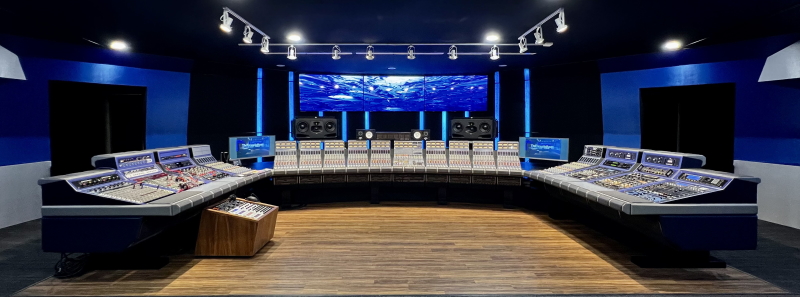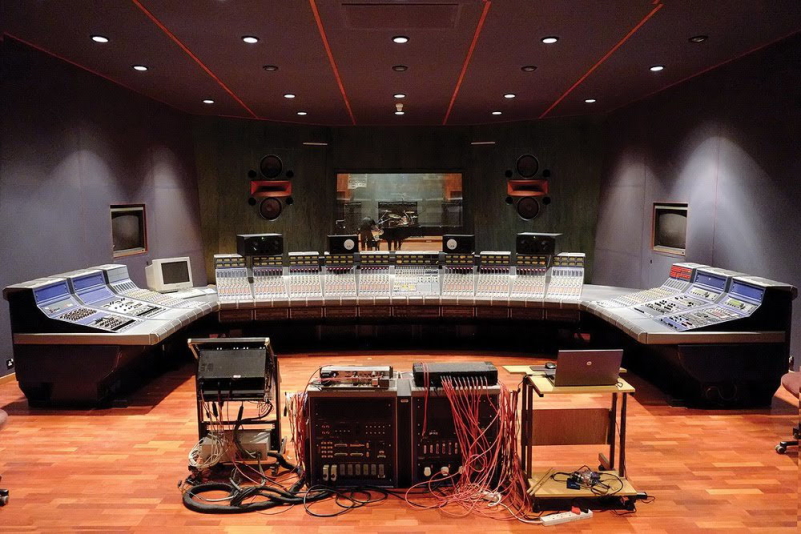Focusrite Studio Console is Centerpiece of New Focusrite Room Studio

One of only a handful of historic Focusrite audio consoles has been brought back to life and installed in The Focusrite Room, a unique 1500-square-foot control room, part of a 6,000-square-foot recording complex in the Phoenix area. The Focusrite Studio Console, one of only 10 ever built (specifically, unit #5) and one of only four known to still exist, was installed in the facility late last year and has just finished its commissioning phase. The console was originally located at BOP Studios in South Africa, itself a pioneering world-music venture. Now, one of the world’s few remaining Focusrite Studio Consoles is back in operation, ready to make music – and history – again. Explore The Focusrite Room in 3D here.
“Bringing Number Five back was a life-changing event,” says The Focusrite Room and Platinum Underground studio owner and longtime Focusrite aficionado John Aquilino, referring to the nickname the desk has acquired. “When I was a teenager, instead of a poster of Farrah Fawcett on my wall, I had a picture of a Focusrite Studio Console, so you could say I’m a pretty big fan of the brand and its technology. Now, this console is ready for the next chapter in its life.”
BOP Studios began with the best of intentions: to be a world-class music-production facility in one of the world’s most remote yet creatively fertile locations. South Africa was thrust upon the global music stage with the release of Paul Simon’s Graceland album in 1986, which opened the world’s ears to the music and musicians of that part of the world, with some of that LP (which won the GRAMMY Award for Album of the Year in 1987) recorded at Ovation Studios in Johannesburg, South Africa, by Simon and engineer/producer Roy Halee. Despite the country being under the oppressive thumb of Apartheid at the time, BOP Studios, financed by a combination of private investment and state and local pension funds, opened in 1991, intended as a destination where African and Western artists and musicians could intersect and collaborate, with state-of-the-art technology, acoustical design (the studio’s architect was the legendary late Tom Hidley) and resort-level accommodations. The Focusrite Studio Console was a centerpiece in BOP’s flagship Studio 1, where it operated alongside consoles from Neve (Studio 2) and SSL (Studio 3) – all three were the largest of their kind ever installed at the time.
BOP Studios briefly achieved some of its aspirations. Visiting artists included Laura Branigan, Ladysmith Black Mambazo, Miriam Makeba, and the Soweto String Quartet; Disney’s The Lion King soundtrack was also recorded and produced at the studio. But political and economic complications posed significant challenges to keeping the facility viable, and it has been closed for much of the last 20-plus years. However, the Focusrite Studio Console was remarkably intact when Aquilino discovered it. He organized a team including his partner in the studio, Ken Hirsch of Orphan Audio, as well as guidance from Phil Dudderidge, Chairman of Focusrite Audio Engineering, who had acquired Focusrite from founder Rupert Neve in 1989. The team went to BOP Studios in September 2019, where they purchased and disassembled the console over the course of ten days, then shipped it back to Platinum Underground, where Aquilino had already designed (with Hanson Hsu of Delta H Design) a new studio room to be built around it. (Platinum Underground, which opened in 2016, was designed by the late Vincent Van Haaff and is constructed 30 feet below ground; the new Focusrite Room is above and to the side of that.)

Not surprisingly after all that time, the relocated console needed some refurbishing, which included a complete recapping and new switches, as well as the replacement of 4,600 LEDs. The restoration process was initially started by Joel Gette of Thermal Relief Design in Las Vegas, before the desk was moved to its new site in the Phoenix suburb of Mesa for its full and complete restoration and recommissioning by Ken Hirsch and his team at Orphan Audio. Once inside the studio, additional HVAC, with a custom plenum and silent-running fans, had to be installed to keep the console at a constant 72 to 74 degrees F. The console’s original two 7-foot-tall power racks have been replaced with just 3 feet of modern, high efficiency supplies designed by Hirsch. The ancient GML automation is replaced with the Tangerine Automation Interface for GML Automation from THD Labs, which integrates directly with the console faders on a fader-by-fader, bucket-by-bucket basis, with all of that control information sent over a USB bus
to the computer. “The automation is now seamless and transparent between the hardware of the desk and the user’s DAW,” Aquilino explains. “Any user can come in to the studio, fire up a session, load up this plug-in and just go, and not have to worry about knowing some archaic, proprietary software.”
The Focusrite Studio Console came back to life late last year and did a series of local productions with Aquilino, an accomplished engineer for artists including Metal Allegiance, Sacred Reich, and SoulFly, at the board. “I needed a great team to make this happen, like TRD, everyone at Ken’s shop, and of course, Phil,” he says. “But the result is the kind of console that made classic recordings. You cannot duplicate this in today’s business - the console’s cabling is silver wire….. kilometers of it! There is nothing like it anywhere. And now, it's an amazing console in an amazing space.”
As remarkable as the resuscitated Focusrite Studio Console is, that’s far from the only Focusrite technology in the facility. Aquilino says that the studio is in the process of implementing Dante® connectivity between both the new Focusrite Room and The Platinum Underground‘s existing SSL control room, large tracking room, and isolation booths, complemented by RedNet A16R and HD32R interfaces throughout both studios. “This will allow us to smoothly move projects between spaces, as well as increase flexibility of session management,” he explains, adding that having both vintage and contemporary Focusrite gear in the same facility is the best of both worlds. The studio also has 12 Focusrite ISA 215 dual rack mount mic pre-EQs, for a total of 24 channels of original ISA 110s (each 215 contains two of the original ISA 110 mic pre /EQ circuits in each box). Finally, Aquilino says he’s chosen the S5H speaker from ADAM Audio – part of the Focusrite family – for the mains in The Focusrite Room. “They are absolutely amazing speakers. Just stunning sounding,” he says. “They are the perfect complement to #5. Incredible depth, amazing detail, and the imaging is spectacular.”
The Focusrite Studio Console had a deep impact on many people’s lives and careers and is much loved by the engineers, producers, and musicians who have experienced it up close. Using Rupert Neve's original design of the ISA 110 EQ processor as inspiration, the Focusrite Studio Console is thought of as the pinnacle of British audio-console innovation. A documentary about it can be seen here.
 How to resolve AdBlock issue?
How to resolve AdBlock issue?